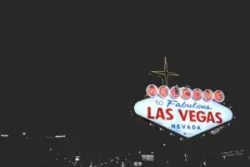
In short, the answer is no, prostitution is not legal in Las Vegas. Nevada is the only state in the country in which prostitution is actually legal. That being said, Nevada allows prostitution only in licensed brothels. Geographically, brothels can be licensed in only eight counties in the state. Clark County—the county in which Las Vegas is located—is not one of them. In other counties in Nevada and outside of the licensed brothels within the counties where it is legal, prostitution and solicitation are illegal. Pandering is also illegal. In fact, prostitution and solicitation are misdemeanor crimes; pandering is a felony.
How Nevada Law Defines Prostitution
Prostitution is defined under Nevada law as engaging in sexual conduct for a fee. Nevada Revised Statutes (NRS) 201.295 considers sexual conduct to include any touching of the genitalia or other intimate parts of a person in order to arouse or gratify sexual desire in either person, as well as sexual intercourse, and oral-genital contact. Solicitation—or seeking out—prostitution is illegal in Nevada, except in a licensed brothel. The crime of solicitation increases to a felony when a minor is involved.
The crimes of solicitation and pandering involve greater penalties when the crimes involve minors (i.e., individuals under the age of 18). One of the penalties includes requiring the accused and convicted to register as a sex offender. If a person induces, encourages, entices, persuades, or compels another to become a prostitute or continue in prostitution, the inducer can be convicted of pandering. In other words, pandering encompasses a person’s efforts to persuade another to work in prostitution. A person may be charged with pandering whether or not the persuasion was for legal or illegal prostitution.
Laws Governing Brothels
While prostitution is legal in Nevada, it is still subject to numerous restrictions. As noted above, when prostitution occurs outside of the eight allowable counties and outside of a licensed brothel, it is outright illegal. Even in licensed brothels, there are limits as to who may work in them and where they may be located. For example, a licensed brothel may not be located within 400 yards of a school or house of worship. A brothel also cannot be operated in a building that has entrances or exits to (or is front facing) to a principal business street or thoroughfare in the state. This includes property that is rented as a brothel. Moreover, anyone arrested for prostitution must submit to an HIV test. Anyone who engages in prostitution, whether in a licensed brother or otherwise, after being notified of his or her HIV positive status may be charged with a felony.
There are several defenses that may be put forward if a person is charged with prostitution, pandering, solicitation, or another prostitution-related offense. This includes no “sexual conduct,” or that whatever touching occurred was not intended for either party to experience arousal or any sexual gratification. No specific intent to pander, meaning that if there is no intent to induce a person to engage in prostitution, then no pandering occurred.
If you or anyone you know has questions about this or any other legal issue, contact the knowledgeable attorneys at H & P today.




